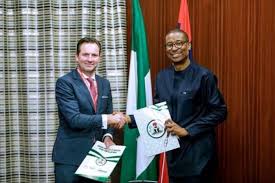There are no products in your shopping cart.
| 0 Items | £0.00 |

 GERMAN car giant Volkswagen has signed a memorandum of understanding (MoU) with the Nigerian government as part of an ambitious plan to turn the country into the automotive hub of the West African sub-region.
GERMAN car giant Volkswagen has signed a memorandum of understanding (MoU) with the Nigerian government as part of an ambitious plan to turn the country into the automotive hub of the West African sub-region.
Long considered the key to West African prosperity, Nigeria accounts for about half of the sub-region's population and is always the first destination considered for investment. Historically, car manufacturers like Volkswagen and Peugeot have owned assembly plants in Nigeria, although so far, none of them has opened a manufacturing facility.
Last week, during the visit of German Chancellor Angela Merkel to Nigeria, a new MoU was signed with Okey Enelamah, the minister of industry, trade and investment, signing on behalf of Nigeria. This new agreement will see plants being built in Nigeria, expanding the automobile market across the African continent.
A similar agreement was also signed between Volkswagen and Ghana, with the Ghanaian vice president Mahamudu Bawumia, signing on behalf of the country. That MoU will seek to explore the development of new mobility solutions in the country.
Thomas Schaefer, the head of Volkswagen’s sub-Saharan region, said: “Both memorandums of understanding demonstrate one thing, the seriousness with which Volkswagen takes its commitment to Africa. The situation on the continent has stabilised and the economy is moving forward.
"The final hurdles for the development of the automotive industry there have been removed as a result. This is a great opportunity for us.”
Volkswagen’s expansion agenda in Nigeria will include developing a training academy, in conjunction with the German government. A plan to develop a comprehensive Volkswagen vehicle and service network in the country is also in the works, but is subject to commercial viability.
Nigeria's government has pledged to accelerate the passage of automotive policies to make it easier car manufacturers to locate plants in the country. Mr Schaefer added that this will include the gradual transition from the importation of used cars to the manufacture and distribution of new passenger vehicles.